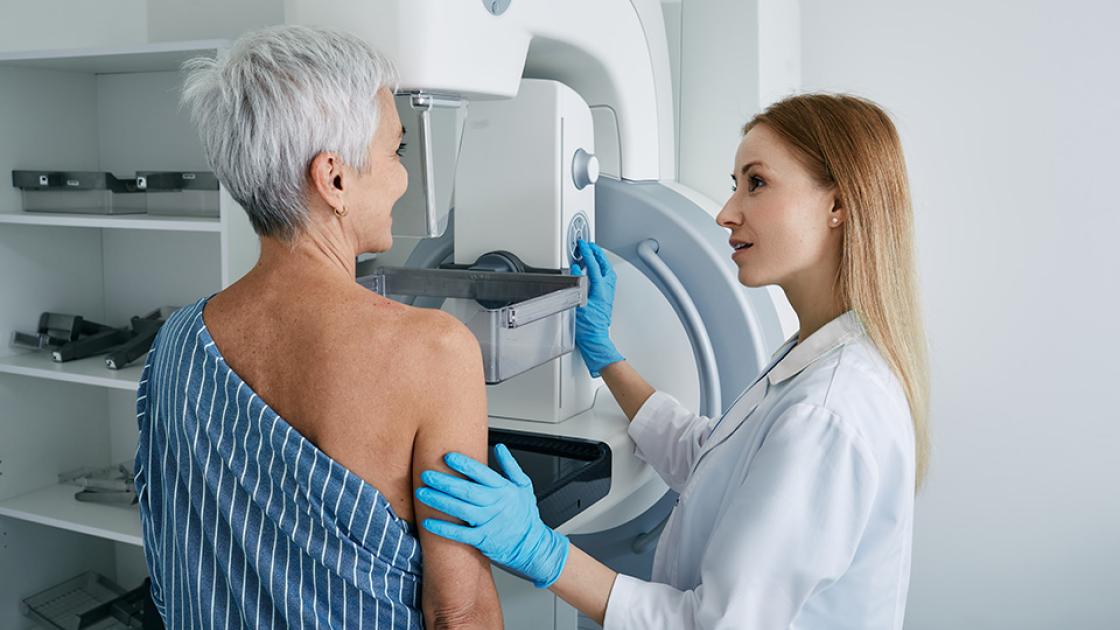
FDA requires patient notification of breast density
Nearly half of women age 40 and older have dense breasts, which can make mammograms harder to read. This increases the likelihood of missing cancer during screening. Dense breasts are also an independent risk factor for breast cancer. To address this, the U.S. Food and Drug Administration (FDA) now requires mammogram facilities to notify patients about their breast density.
ANSWERS TO COMMONLY ASKED QUESTIONS ABOUT BREAST DENSITY
What are dense breasts?
Breasts contain glandular tissue, fibrous connective tissue, and fatty breast tissue. Breast density is a term describing the relative amount of each type of breast tissue seen on a mammogram. Dense breast tissue has relatively high amounts of glandular tissue and fibrous connective tissue and relatively low amounts of fatty breast tissue.
Are dense breasts common?
Yes, dense breasts are common. Nearly half of all women age 40 and older who get mammograms have dense breast tissue.
How is breast density categorized in a mammogram report?
Doctors use the Breast Imaging Reporting and Data System (BI-RADS) to classify breast density. This system, developed by the American College of Radiology, helps doctors interpret and report back mammogram findings. BI-RADS classifies breast density into four categories:
1. Entirely fatty breast tissue: The breast is almost all fatty tissue. It is found in about 10% of women.
2. Scattered fibroglandular breast tissue: There is mostly fatty tissue with some areas of dense glandular and fibrous connective tissue. It is found in about 40% of women.
3. Heterogeneously dense breast tissue: There are many areas of dense glandular and fibrous connective tissue, with some areas of fatty tissue. It is found in about 40% of women.
4. Extremely dense breast tissue: There is almost all dense glandular and fibrous connective tissue. It is found in about 10% of women.
If your mammogram report letter says you have dense breasts, it means that you have either heterogeneously dense breast tissue or extremely dense breast tissue.
What factors influence breast density?
Breast density is often inherited, but other factors can influence it.
• Factors associated with higher breast density include using menopausal hormone therapy and having a low body mass index.
• Factors associated with lower breast density include increasing age and having children.
Are dense breasts a risk factor for breast cancer?
Dense breasts are not considered an abnormal breast condition or a disease. However, dense breasts are a risk factor for breast cancer. That is, women with dense breasts have a higher risk of breast cancer than women with fatty breasts. This risk is separate from the effect of dense breasts on the ability to read a mammogram.
Should women with dense breasts have additional screening for breast cancer?
The value of additional, or supplemental, imaging tests such as ultrasound or MRI to screen for breast cancer in women with dense breasts is not yet clear, according to the Recommendation Statement on Breast Cancer Screening by the United States Preventive Services Task Force. Talk with your doctor or nurse to learn recommendations for you based on your personal medical history and family medical history.
How do I know if I have dense breasts?
You cannot feel dense breast tissue, such as during a breast self-exam. Only a radiologist looking at a mammogram can tell if a woman has dense breasts. Dense breasts are sometimes called mammographically dense breasts.
Does having dense breast tissue affect a mammogram?
Dense breasts can make a mammogram more difficult to interpret. That’s because dense breast tissue and some abnormal breast changes, such as calcifications and tumors, both appear as white areas in the mammogram, whereas fatty tissue appears as dark areas.
As a result, mammography is less sensitive in women with dense breasts—that is, it is more likely to miss cancer. Women with dense breasts may be called back for follow-up testing more often than women with fatty breasts.
Are patients with breast cancer who have dense breasts more likely to die from breast cancer?
No. Research has found that breast cancer patients who have dense breasts are no more likely to die from breast cancer than breast cancer patients who have fatty breasts, after accounting for other health factors and tumor characteristics.
What questions should I ask my provider to learn more about dense breasts and my risk for breast cancer?
• What are the dense breast-related findings in my recent mammogram?
• Do you recommend additional screening or diagnostic tests for me?
• What is my overall personal risk of breast cancer, given my risk factors and protective factors?
When do I need to get a mammogram?
If you’ve never had a mammogram, and you’re over the age of 40, it’s time to schedule one with your provider. Mammogram guidelines were recently updated; read more about these guidelines in this blog. https://www.siumed.org/blog/updated-mammogram-guidelines-women-aged-40-…
What should I expect at my first mammogram?
We’re glad you asked. Read more about what to expect at your first mammogram in this blog. https://www.siumed.org/blog/what-expect-your-first-mammogram
How can I schedule an appointment to talk with a provider?
If you're looking for comprehensive women’s health care, contact SIU Medicine today to schedule an appointment or find a provider who can answer your questions.



